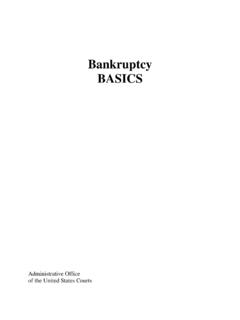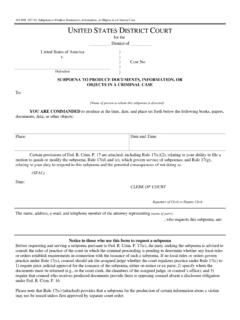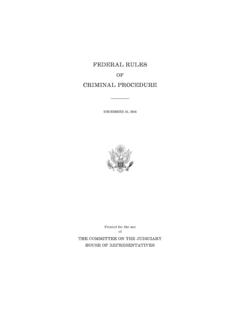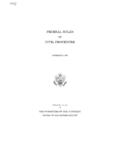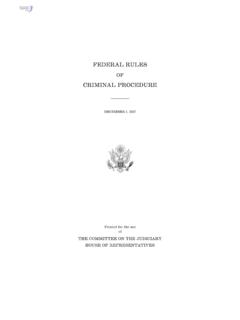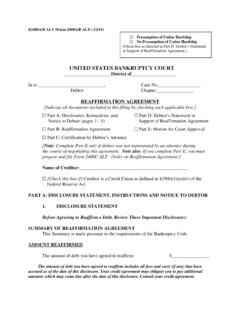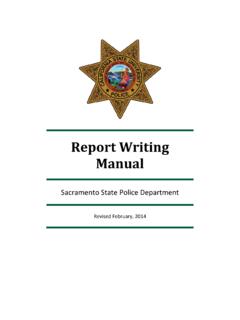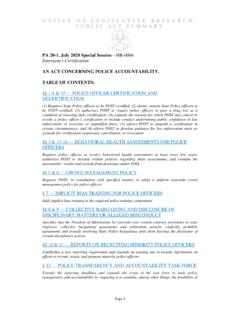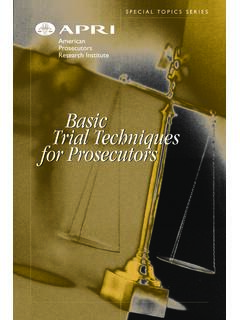Transcription of Home Probation and Parole Officers and Discretionary ...
1 Volume 71 Number 1 HomeProbation and Parole Officers and DiscretionaryDecision-Making: Responses to Technical and CriminalViolations 1 Mark Jones, East Carolina UniversityJohn J. Kerbs, East Carolina UniversityLiterature Review Discretion with Court-Related Personnel Discretion and CorrectionsStudy PopulationDiscussionConclusionIN A RECENT ESSAY Chris Eskridge (2004) identified four necessary elements in thedispensation of perfect justice:the absolute ability to identify law violators;the absolute ability to apprehend law violators;the absolute ability to punish law violators; andthe absolute ability to identify the intent of law , Eskridge recognized that the criminal justice system is far from perfect and that thereare few if any absolutes.
2 In this vein, Eskridge noted that multiple factors inhibit the creation ofa perfectly just system of justice administration. For example, the innocent are occasionallypunished, while the guilty escape punishment. Additionally, the guilty are sometimes punishedmore severely or punished less severely than administration of justice is largely dependent upon the actions of individual human beingswho are subject to making procedural and/or mechanistic mistakes in the course of doing theirjobs. police Officers may do a poor job of gathering physical evidence; thereafter, prosecutorsmay make strategic errors in handling a case.
3 Finally, correctional Officers may fail to takeproper security precautions that result in injuries or error is not the only reason that the administration of justice is non-uniform in itsapplication. A much larger factor is human discretion or the use of personal decision-making andchoice when criminal justice professionals carry out their respective duties and discretion is utilized by all criminal justice professionals engaged in professional decision-making, this paper examines how Probation and Parole Officers (PPOs) working withincommunity-based corrections utilize number of factors that may significantly affect PPO discretion include:differing philosophical orientations to criminal justice goals like rehabilitation versusretribution;scholarly interpretations of the law.
4 Formal organizational and/or community practices; and finallypersonal study focuses on the fifth factor (personal preferences) for PPOs. More specifically, thisstudy examines PPO s preferred responses to probationers and parolees who breach theconditions of their community supervision by committing technical and/or criminal there is a limited but emergent body of literature on Discretionary decision-making bycriminal justice practitioners, we begin this article with a brief chronology documenting the useof discretion among criminal justice professionals to include police Officers , court-relatedpersonnel, and correctional staff.
5 Thereafter, we present the results and policy implications of anational survey of Discretionary decision-making among members of the American Probationand Parole Association (APPA). Ultimately this study aims to take a modest but important steptowards understanding PPO preferences for responding to community-supervised offenders whoviolate the conditions of their Probation / Parole . back to topLiterature ReviewPolice DiscretionPolice discretion plays a large role in determining if a person is released without action, cited orarrested for an alleged infraction of the law. The first recognition of police officer discretion incriminal justice writings appeared in 1963.
6 Herman Goldstein, then an executive assistant toChicago police Chief Wilson, wrote on the topic of discretion. He documented the Officers routine use of discretion when deciding whether to make an arrest or issue a ticket (Goldstein,1963). Considered cutting edge at the time of publication, Goldstein s article containedinformation and ideas that are common knowledge in policing circles today namely thatofficers routinely ignored or issued warnings for certain minor offenses, and these offenses werealternately enforced or ignored because of certain precinct practices and individual writing about police discretion, Ho (2004) noted that discretion is a manifestation ofselection bias, which rests upon many factors to include the individual exercising (2003) examined two views on the durability of discretion.
7 The first view represented anenlightened and flexible (service-oriented) way of dealing with social problems: in contrast, thesecond view represented a selective (legalistic) approach to enforcement, and one that ultimatelyallowed Officers to define justice in accordance with their own priorities and individualprejudices. Wortley also wrote on the difficulty of measuring discretion since criminal justicedecisions are seldom based on a single rationale, such as race, gender, or age. In fact, manyvariables enter a police officer s mind when making the decision to take formal action against anaccused offender.
8 Finally, Wortley highlighted the need for policies and procedures to be inplace to insure the appropriate use of discretion. This is easier said than done. The use ofindividual discretion is an inevitable part of the justice system process, which ultimately informsthe generation of citations and arrest reports for alleged infractions that are subsequentlyprocessed by prosecutors and to topDiscretion with Court-Related PersonnelThe use of discretion among court-related personnel is perhaps most evident among prosecutorsand judges. With regard to prosecutorial discretion, a highly visible use of their discretion isfound within plea negotiations, the process of deciding which cases to present before a grandjury and which cases should receive priority in prosecuting.
9 Plea negotiating or plea bargainingwas not recognized as a significant part of America s criminal justice system until after theAmerican Civil War (1865), and it has been studied and analyzed repeatedly since then(Alschuler, 1979; Bond, 1975; Friedman, 1979; Durose & Langan, 2005). Ultimately, thedecision to plea bargain cases rests on (among other things) a mix of prosecutorial and judicialpriorities and how crowded court calendars are on any given day. When court calendars becomecrowded or bogged down, judges can put pressure on prosecutors to plea cases quickly. Thus, prosecutors do not act in isolation when it comes to plea , by the very nature of the job they perform ( , potentially depriving people of theirliberty or their life), have always been viewed as the ultimate decision makers in the criminaljustice system.
10 For this reason citizens in democratic societies would like to think that judgespossess, at a minimum, the characteristics of fairness and wisdom. In spite of the recognition thatjudges must utilize discretion when handing down their sentences, the past three decades havebrought structured sentencing to many jurisdictions. Structured sentencing serves as an obstacleto a judge s ability to fully exercise discretion and can limit a judge s ability to select and handdown certain types of sentences. Structured sentencing was also designed to help control andlimit prosecutorial discretion because grand juries have often been dominated by prosecutors andhave served as rubber stamps for prosecutors .
